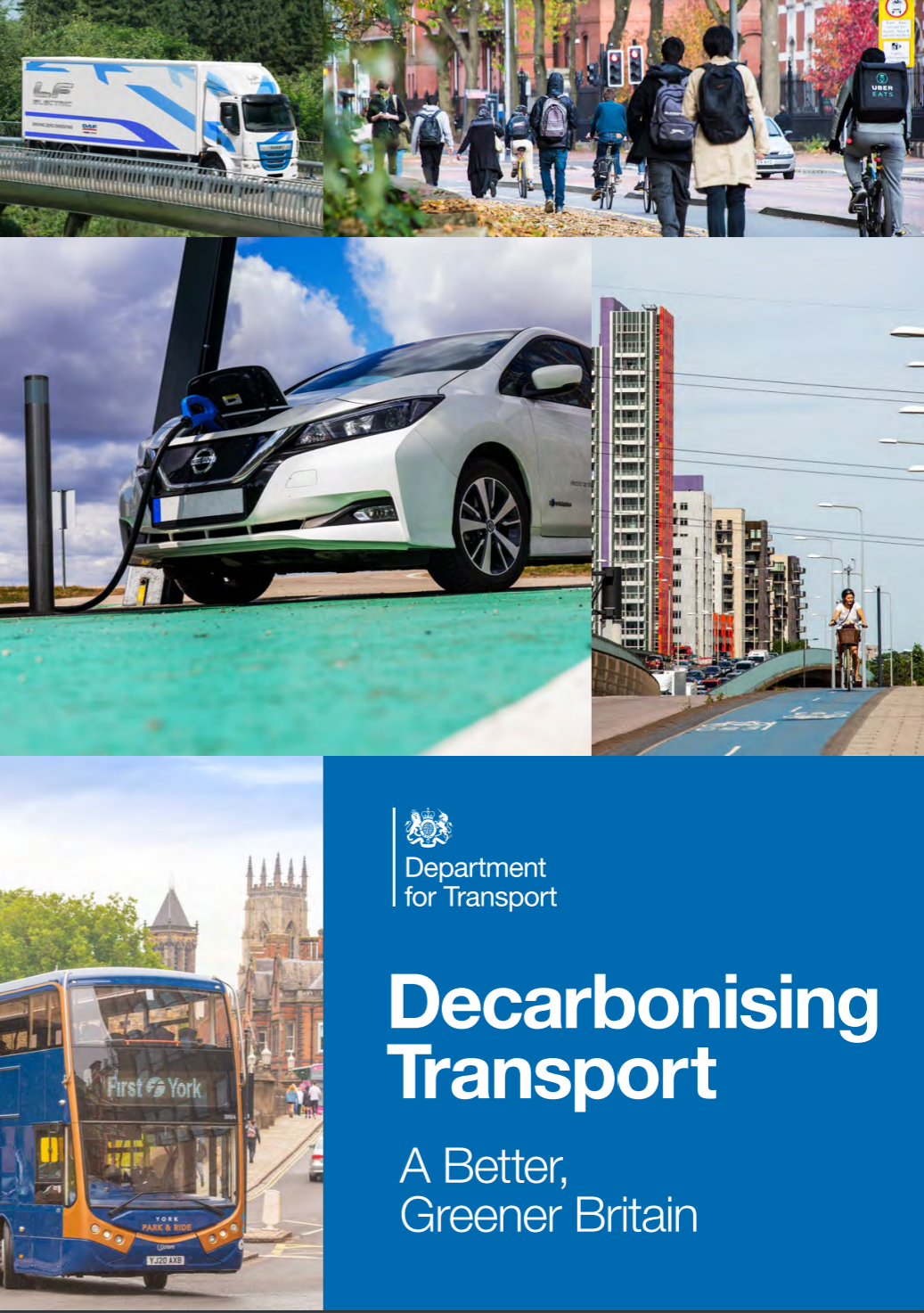Department for Transport - Transport Decarbonisation Plan: quick review...
This was originally planned to be a thread of linked tweets - hence the formatting below - but it outgrew that! It is a summary of my immediate responses to my first pass through the Department for Transport’s report Decarbonising Transport - A Better, Greener Britain - AKA the Transport Decarbonisation Plan.
TLDR - positive, particularly that it comes with some timelines, budgets and objectives but some important topics are underplayed that require further exposition (see summary below)
P1: Helmeted and non-helmeted cyclists using high quality infrastructure alongside pedestrians for everyday journeys 👍👍👍
P4: "It’s not about stopping people doing things: it’s about doing the same things differently." 🤔🤔 - this makes me nervous. The quoted text comes across as - ‘don’t worry, we can tweak a few things and everything else can carry on as normal’ but my feeling is some things will have to be done differently - we’ll need to engage on the ‘winners’ and ‘losers’ (who, where, why and how - on both sides) in various potential scenarios and develop strategies to maximise the wins and minimise the losses.
P5: “Our ambitious roads programme reflects – and will continue to reflect – that in any imaginable circumstances the clear majority of longer journeys, passenger, and freight, will be made by road.” 🤔🤔 - Possible lack of imagination? 😀 Of course, the roads programme is one of the areas of contention. The balance of investment will likely worsen dependence on private car use, a mode that brings so many other issues (even if electric).
P6: "...it will be essential to avoid a car-led recovery." 👍 - ...but, the horse may not quite have bolted on this yet but it's certainly headed towards an open stable door...! https://www.gov.uk/government/statistics/transport-use-during-the-coronavirus-covid-19-pandemic
P9: "Increasing cycling and walking" 👍 - great to see this first on the list and that the value of walking is recognised throughout the document.
P29: "Co-benefits" 👍 - also great to see the multi-departmental nature of transport recognised e.g. safer roads + cleaner air + more active travel = less pressure on NHS.
P32: “The current transport system places wider costs on society, that we are seeking to address” 👍 - The flip side of the above – in addition recognising distributed benefits of transport, we must also do better at recognising the true costs (not just economic) that the different transport modes place on society.
P36 / 38: “Accelerating modal shift to public and active transport” 👍 - Love that this is listed as strategic priority number 1.
P38: “A cohesive, integrated, and affordable net zero public transport network, designed for the needs of the passenger, will empower users to make sustainable end-to-end journeys and enable inclusive mobility.” 👍 - Great ambition but 🤔 - set against cuts in bus services over the last decade and increases in train fares relative to wages, we should be under no illusion about the challenges embedded within this statement. The recent Bus Back Better plan and Williams-Shapps Plan for Rail give some indication of future direction for the respective modes.
P53: “By 2040 - We will have a world class cycling and walking network in England” 👍 - I hope so! By world class, presumably we are talking about aiming for Netherlands, Copenhagen etc.. The actions of Mayor Anne Hidalgo in Paris are showing what leadership looks like in this regard. Also good to the impact of noise recognised on this page - the detrimental health effects of transport noise are probably underappreciated at present.
P70: 😍- Lovely picture of The Queen’s College, Oxford (where I did my DPhil 😀)! @QueensCollegeOx
P90: “We will introduce a rail freight growth target” and “We will incentivise the early take up of low carbon traction for rail freight” 👍 - definitely think there is huge potential to make use of capacity on the rail network for freight movements if technology can be used to allow more frequent services at shorter time headways and intermodal integration can be improved.
P96: “We will lead by example with 25% of the Government car fleet ultra low emission by December 2022 and 100% of the Government car and van fleet zero emission by 2027” 👍 - this will help other fleets to be able to make this change and will help the market transition to EV sales (with a secondary benefit of there being more lower cost secondhand EVs coming through for those unable / unwilling to pay for a new car).
P103: “…we will need to ensure that the tax system encourages the uptake of EVs and that revenue from motoring taxes keeps pace with this change.” 👍 - obviously there will be a need to reconfigure revenues from motoring to shift away from incentives from EVs and to replace traditional fuel and vehicle duties but 🤔 - no detail on what that might look like.
P117: “Decarbonising aviation is one of the biggest challenges across the global economy.” 🤔 - It sure is. As noted on P4 above, the tone of the aviation section seems to suggest being able to achieve net zero with few constraints on us being able to continue to fly where we want, when we want at a low price. I’m not sure that will be the case. That said, ensuring the UK leads in developing low / zero emission aviation technologies has to be 👍.
P121: "We will consult on a target for UK domestic aviation to reach net zero by 2040" 👍👍 - obviously scrutiny needed over what net zero means and consulting on a target doesn't necessarily mean setting one but good to see the ambition.
P127: "Carbon Offsetting in Transport" 🤔 - care needed, the balance of the plan seems to be right to focus on elimination and reduction of emissions before considering offsetting - I hope that's the case.
P138: "We will support and encourage modal shift of freight from road to more sustainable alternatives, such as rail, cargo bike and inland waterways" 👍 - yes, support @pedalmeapp and others in growing the cargo bike delivery business!
Also work on rail technology, capacity and prioritisation to allow freight trains to serve more use cases, more of the time using efficiency, zero emission traction.
P151: "We will drive decarbonisation and transport improvements at a local level by making quantifiable carbon reductions a fundamental part of local transport planning and funding" 👍 - yes, allow decentralised planning + delivery of common aims and objectives (with evaluation!)
(This page also features a picture of @Cargodale2 😀👍)
P153: "Working together to decarbonise Coventry and the surrounding areas" 👍 - I think there are some great opportunities to revitalise VLR with small-ish accessible, automated services.
P161: "We will create at least one zero emission transport city and four industrial ‘SuperPlaces’" 👍 - good to have the ambition; 🤔 - nervous about labelling locations in this way, some aspects might not seem 'super' to some - becoming an easy target for those unhappy with the new developments (cf 'Smart' Motorways).
P162: "Light Rail – an existing zero emission choice" 👍 - like VLR, good opportunities to use low impact, accessible and cost effective (possibly automated) light rail services as feeders to main line rail.
P166: Low carbon fuels 🤔 - nervous about this as they might bring the temptation to delay the necessary transition to other propulsion types - must be considered in terms of the overall pathway and any short term economic opportunities.
P174: "Hydrogen is a key strategic component to fully decarbonising the UK’s economy." 🤔 - obvious benefits to this approach but care needed over the efficiency of H2 production, transport and storage. Likely to be highly application specific (and that's ok)
P186: "We will reduce the barriers to data sharing across the transport sector" 👍 - My work on multiple projects has highlighted the value of this and there is genuine interest across the industry - not easy to get it right and make it commercially sustainable.
[Not mentioned in the report but #DataTrust approaches to this look very interesting to me]
P193: "Behaviour change research" 👍 - Great to see social / deliberative research referenced - more of this please. 😀
P194: "We will identify specific opportunities for decarbonisation through innovation in rural areas in the upcoming Future of Transport: Rural Strategy" 👍 - Good to see this is still planned; I was pleased with the 9 principles in the urban strategy - hope rural strategy will match it!
P201: "We will coordinate transport’s investment in R&D, collaborating with key stakeholders through our Transport Research and Innovation Board (TRIB)" 👍 - Sizeable budget (although many calls upon it!) and good to align with @UKRI_News
General comments:
Overall, more positives than minuses – seems to be a considered and ambitious plan, exceeding what even the most optimistic sustainable transport advocates could have hoped for five years ago with “Public transport and active travel will be the natural first choice for our daily activities” (bullet point 1 for strategic priority 1!) and talk of “radical change”, “phase out dates for non-zero emission vehicles” and “A cohesive, integrated, and affordable net zero public transport network” etc.
We now have timelines, budgets, projections and plans against which progress can be tracked and scrutinised.
Good sense of cohesion within the Department for Transport and across government for this plan with transport recognised as a system in itself and as a vital contributor to the wider system of society.
However, some topics require further exposition - in particular:
How are the aims for decarbonisation squared away with the £27bn roads programme?
How will we shift away from incentives for EVs and replace fuel and vehicle duties? Some form of road user charging, right? Will technologies and modern attitudes to environmentalism make this any more politically palatable than it has been in the past?
What happens when the required shifts to alternative modes meet with public opposition - particularly in regions that may be more resistant to the changes required? Can this inertia be overcome?
Will the proposed budgets be sufficient to deliver on the ambition - especially in the context of ageing road and rail infrastructure?
Seeking other views?
How about the usual high quality report from @jillian_anable and @DrGregMarsden from the @CREDS_UK team.
Or the great decarbonisation road-mapping work by my teammates on DfT Futures work, @GlennLyons2, @nextwavefutures and @CharRohr1.
Or @GlennLyons2’s direct response to the plan posted on LinkedIn.
Or Chair of ITS-UK and TRL’s Head of Digitalisation, Ryan Hood’s views.
Or the Campaign for Better Transport’s response.

